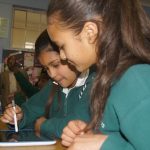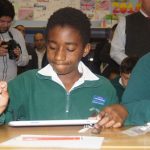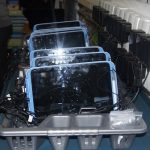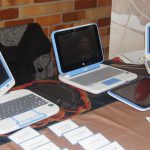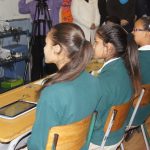“All right grade sevens, lets take out our tablets,” the voice calls out from the front of class. Now there’s something you wouldn’t have heard in any South African classroom ten years ago. But at Bergvliet Primary School in Cape Town, it’s nothing new to the youngsters.
At Bergvliet all classes have “tablet day”, when the pupils swap their books and pens for tablets and styluses to conduct lessons and activities. Forty tablets are shared between the different classes, but each child gets to use their own tablet during lessons.
The tablets come from Kolok South Africa, and are designed by Intel with school children in mind, so they are durable, lightweight and can withstand daily use and minor accidents that may happen. Each tablet comes installed with Intel Education Software that’s specially programmed for South African school curriculum.
 Since some lessons are online, free WiFi is provided by Vox Telecom and Bhelela Communications ensures that an offline content storage facility is available on each tablet. Computers 4 Kids provides training for teachers.
Since some lessons are online, free WiFi is provided by Vox Telecom and Bhelela Communications ensures that an offline content storage facility is available on each tablet. Computers 4 Kids provides training for teachers.
Teachers conduct lessons using the Intel software and learning material that is installed on their laptops and use a Smart Board to project theirs and the kids’ tablets screen per time or simultaneously.
For now, the tablets stay in the classroom, so kids still go home and do their homework the traditional way, but the school does want to get to a point where each child has a tablet they can take home so that they can carry on with work on their own and have their parents being hands-on and seeing exactly what their child is learning at school, communicate with the teachers more effectively and see the progress their child is making in all subjects.
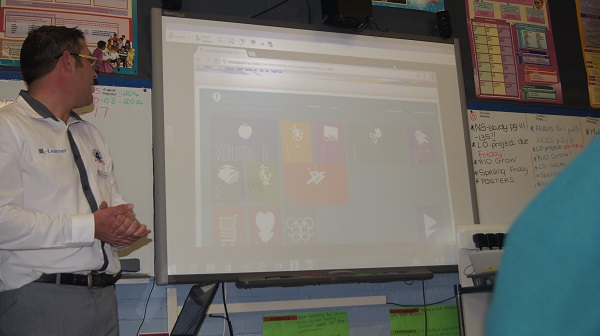
During a demonstration lesson, which involved a pop quiz, a magnifying glass lesson and dictionary lesson, the teachers explained that they can monitor each child’s progress by seeing exactly what they’re doing on their tablet from their laptop and take over if they have to, which helps make sure they’re paying attention and actually working.
Once the learners are done with the work, they submit it and a tick indicating they’re done pops up on the progress page. With this teachers can tell which student is still struggling with the lesson and perhaps needs a bit of help. One interesting feature that helps teachers is one that determines which particular content the class struggles with on average, so the teachers can see if they’re getting the message across to the kids effectively and whether or not they need to improve their teaching in certain areas.
Bergvliet Primary was chosen to host the pilot project starting in 2013 when the principal, Mrs de Beer, approached Intel as it was interested in incorporating elearning into the school curriculum. According to Intel, Bergvliet Primary offered an ideal opportunity as it already had good management structures, teachers and systems in place to help ease the use of tablets into the structure.
“We believe this model will be good for the Western Cape Department of Education to implement all over the province and for us to determine what works and doesn’t work so we can improve on it as we go along,” explains Andre Christian, education business development manager at Intel.
As for the kids, there’s no doubting that they love using the tablets, as Resego Molefe, one of the learners in the class told me “It’s a fun and exciting, more modern way of learning. There’s a big difference since we started using them and my school work has gotten better, I definitely like the tablets more than books.”
“The kids learning proficiency, reading skills, application has improved since we started using the tablets,” says English teacher Miss Drake. “Not taking anything away from books, but the fact that all the material in different textbooks can be put into a small tablet is great. For us as teachers, it’s time-consuming as we still have juggle using tablets and still filing everything the traditional way and using both methods, but once you’ve got it, it becomes a smooth process.”
Soon learning with tablets and laptops won’t be such a new phenomenon any more, it’s steadily spreading across the country through partnerships between government and the private sector ensuring schools adopt elearning as soon as possible. Already, the Gauteng Department of Education plans to turn schools in the province into textbook free zones over the next few years. Will other provinces follow suit? There’s no telling at this stage, but they’re certainly catching up.
As we walked out of the class and left the kids to get on with their work, I envied them, I wished we had this technology when I was in grade seven 11 years ago. The kids seemed much more engaged, enthusiastic and eased as they worked on the tablets. It seemed as if it made school work a bit more fun and easier to comprehend for them.
From what I saw, it’s definitely the way forward.






